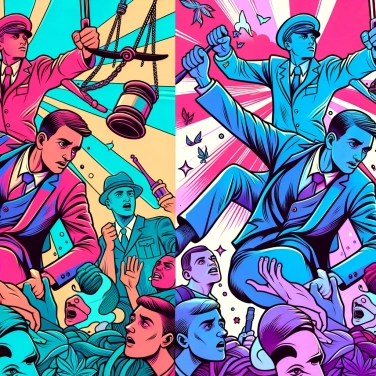Some crimes remain unpunished due to issues related to evidence collection, unreliable testimonies, failures of the judicial system, corruption, or even the statute of limitations.

Some crimes go unpunished because solid evidence is dismissed due to procedural errors, those technical mistakes that occur during the investigation or trial. A missed deadline, an improperly authorized search, and just like that, the evidence is gone. Another issue is overly complex laws, poorly drafted or filled with loopholes, which give lawyers the opportunity to find exploitable weaknesses. Sometimes, crucial witnesses refuse to appear in court, citing legitimate rights like professional secrecy, thereby undermining the entire case. As a result, justice is half-blind even when the perpetrator seems obvious.
Sometimes, a simple mistake in the lab or at the crime scene can completely ruin an investigation. Essential pieces of evidence can be poorly preserved, contaminated, or even lost. For example, if someone handles an object without gloves, their DNA could mix with the evidence, making the results confusing during the analysis. There are also times when investigators completely overlook crucial information by disorganizing files or poorly questioning a key witness. Worse still, incorrect or insufficient use of cutting-edge technology (such as poor management of surveillance footage or misunderstood software) unnecessarily complicates the investigation. These failures sometimes completely prevent the exploitation of overwhelming evidence.
Some crimes escape prosecution due to a form of political protection. Well-connected defendants, close to power, sometimes benefit from discreet cover-ups or behind-the-scenes pressure on judges and investigators. Public pressure also plays a significant role: sensitive cases involving beloved personalities, explosive social crises, or threats of public disorder make institutions hesitant to denounce or openly condemn. As a result, solid cases are swept under the rug simply because they disturb too many people in high places or risk causing too much uproar in the streets.
When police and courts lack resources, handling complex cases becomes a struggle. Small teams, overworked investigators, unavailable experts, or outdated equipment all cause delays in cases. As a result, some crucial evidence, such as DNA or ballistic analyses, ends up piled in a corner for months or even years. Fewer hands and less money also mean less rigorous follow-up on cases, shoddy work, and criminals slipping through the cracks despite solid evidence.
In some cases, even with solid evidence, individuals involved in a crime slip through the cracks simply because the institutions responsible for judging them are affected by corruption. It only takes a judge, police officer, or official to accept a bribe or be subjected to a little pressure for justice to completely derail. Similarly, some organizations protect their own interests rather than the truth, due to more or less acknowledged institutional biases: one defends their camp and colleagues rather than the truth. The most powerful often escape thanks to their connections, while the less fortunate pay the price.
According to the World Bank, countries with underfunded judicial systems by international standards experience an increase of 60 to 70% in the rates of impunity for identified crimes.
Approximately 40% of criminal cases that are dropped are due to procedural flaws or technical errors, even when the initial evidence appears to be very strong.
Transparency International states that each year, corruption costs approximately 1.26 trillion dollars to judicial systems worldwide, significantly hindering the fight against impunity.
A study conducted in 2021 revealed that in nearly 30% of criminal trials, the quality of the handling of scientific evidence (such as DNA) is inadequate or incorrect, thereby compromising the integrity of the proceedings and the final decisions.
Several avenues exist: providing increased resources for investigators and magistrates, strengthening the independence of the judicial system from political power, enhancing professional training in evidence management, and establishing effective oversight mechanisms to prevent corruption and institutional abuses.
Delays may be caused by various factors, including insufficiently prepared investigations, a chronic lack of human or financial resources, as well as political or social pressures hindering the actual progress of the inquiry.
Indeed, corruption and institutional biases can influence the consideration of certain cases, lead to the suppression of investigations, or result in favorable and unjustified judgments for some influential figures.
Political pressures can seriously hinder police or judicial independence, leading to manipulation, withdrawal, or the shelving of investigations, which explains why certain cases remain unpunished despite evidence.
When they notice internal failures, victims may seek remedies before international bodies (International Criminal Court, European Court of Human Rights), or reach out to NGOs to influence public opinion or obtain a new independent investigation.
Acquittal may occur due to procedural errors, the invalidity of certain evidence, or if the legal and constitutional rights of the accused were not respected during the collection of evidence. This can render even compelling evidence inadmissible.

No one has answered this quiz yet, be the first!' :-)
Question 1/5